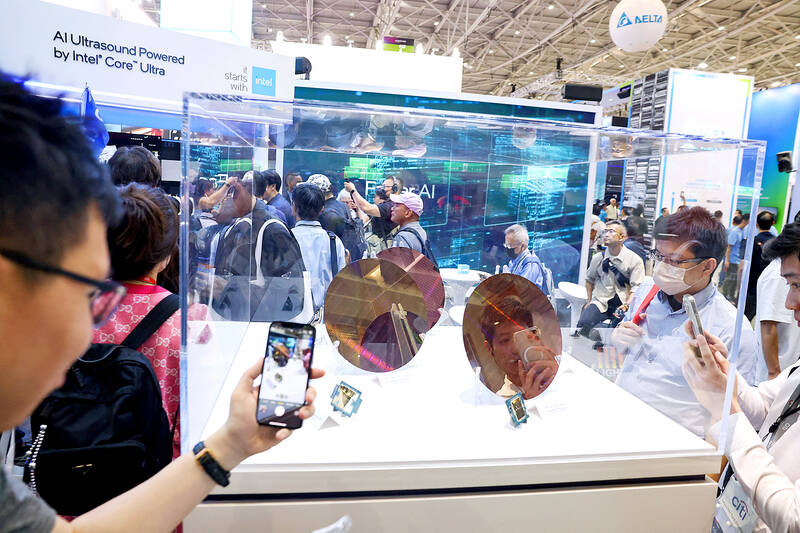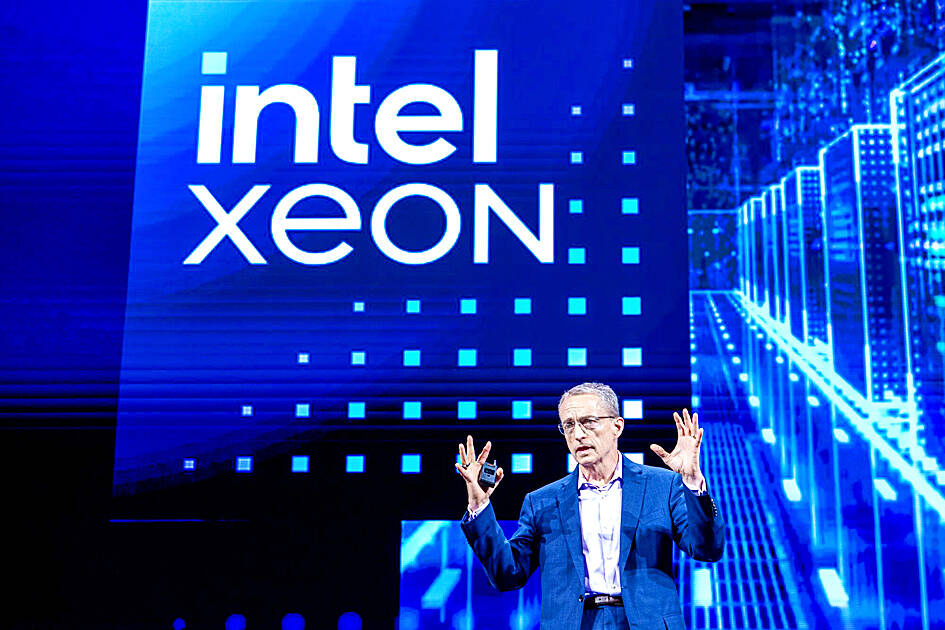US chip titan Intel Corp yesterday struck a defiant tone in the face of strong challenges from rivals Nvidia Corp, Advanced Micro Devices Inc (AMD) and Qualcomm Inc, unveiling technologies it said would lead the artificial intelligence (AI) revolution.
For decades, Intel has dominated the market for the chips that run everything from laptops to data centers. However, in recent years, its competitors, especially Nvidia, have soared ahead on specialized AI processors.
During a keynote speech at Computex Taipei, Intel CEO Pat Gelsinger introduced the company’s latest Xeon 6 processors for servers and shared more details about its next-gen Lunar Lake chips for AI PCs.

Photo: Cheng I-hwa, AFP
“AI is driving one of the most consequential eras of innovation the industry has ever seen,” Gelsinger said.
“The magic of silicon is once again enabling exponential advancements in computing that will push the boundaries of human potential and power the global economy for years to come,” he said.
Intel’s latest equipment provides the best available mix of performance, energy efficiency and affordability, he added.

Photo: Annabelle Chih, Bloomberg
Intel’s Gaudi systems — used for advanced AI work such as training models — would be one-third the cost of similar products from competitors, he claimed.
The Gaudi systems will be offered by partners like Dell Technologies Inc and Inventec Corp (英業達), he said.
“This is the most consequential time of our careers together,” Gelsinger said, reiterating the importance for Intel of working with its partners. “We were made for this moment.”
Gelsinger’s presentation followed earlier keynote speeches by Nvidia CEO Jensen Huang (黃仁勳), AMD CEO Lisa Su (蘇姿丰) and Qualcomm’s Cristiano Amon — and they were replete with claims and counterclaims about which firm’s products were best for AI.
Su and Amon gave detailed presentations on the chips their companies have developed for AI-enhanced PCs, after Microsoft last month unveiled its Copilot+ computers infused with AI features.
Gelsinger took a direct shot at Huang’s claim that traditional processors like Intel’s are running out of steam in the age of AI.
“Unlike what Jensen would have you believe, Moore’s Law is alive and well,” he said, adding that Intel would have a major role to play in the proliferation of AI as the leading provider of PC chips.
“I think of it like the Internet 25 years ago, it’s that big,” Gelsinger said. “We see this as the fuel that’s driving the semiconductor industry to reach US$1 trillion by the end of the decade.”
Gelsinger, in particular, rejected Qualcomm’s claim that its AI PC chips were better than Intel’s.
“I just want to put that to bed right now,” he said. “Ain’t true!”
AI computers are expected to be 80 percent of the PC market by 2028, Intel said, citing the Boston Consulting Group’s projections.
Additional reporting by Bloomberg

South Korea’s equity benchmark yesterday crossed a new milestone just a month after surpassing the once-unthinkable 5,000 mark as surging global memory demand powers the country’s biggest chipmakers. The KOSPI advanced as much as 2.6 percent to a record 6,123, with Samsung Electronics Co and SK Hynix Inc each gaining more than 2 percent. With the benchmark now up 45 percent this year, South Korea’s stock market capitalization has also moved past France’s, following last month’s overtaking of Germany’s. Long overlooked by foreign funds, despite being undervalued, South Korean stocks have now emerged as clear winners in the global market. The so-called “artificial intelligence

NEW IDENTITY: Known for its software, India has expanded into hardware, with its semiconductor industry growing from US$38bn in 2023 to US$45bn to US$50bn India on Saturday inaugurated its first semiconductor assembly and test facility, a milestone in the government’s push to reduce dependence on foreign chipmakers and stake a claim in a sector dominated by China. Indian Prime Minister Narendra Modi opened US firm Micron Technology Inc’s semiconductor assembly, test and packaging unit in his home state of Gujarat, hailing the “dawn of a new era” for India’s technology ambitions. “When young Indians look back in the future, they will see this decade as the turning point in our tech future,” Modi told the event, which was broadcast on his YouTube channel. The plant would convert

‘SEISMIC SHIFT’: The researcher forecast there would be about 1.1 billion mobile shipments this year, down from 1.26 billion the prior year and erasing years of gains The global smartphone market is expected to contract 12.9 percent this year due to the unprecedented memorychip shortage, marking “a crisis like no other,” researcher International Data Corp (IDC) said. The new forecast, a dramatic revision down from earlier estimates, gives the latest accounting of the ongoing memory crunch that is affecting every corner of the electronics industry. The demand for advanced memory to power artificial intelligence (AI) tasks has drained global supply until well into next year and jeopardizes the business model of many smartphone makers. IDC forecast about 1.1 billion mobile shipments this year, down from 1.26 billion the prior

People stand in a Pokemon store in Tokyo on Thursday. One of the world highest-grossing franchises is celebrated its 30th anniversary yesterday.